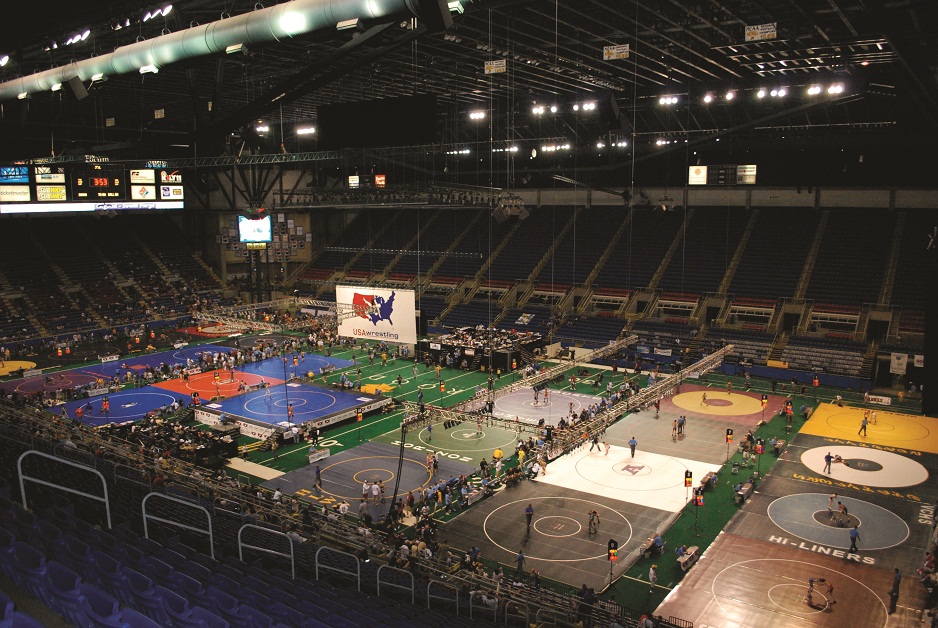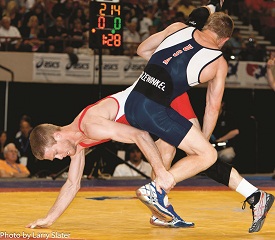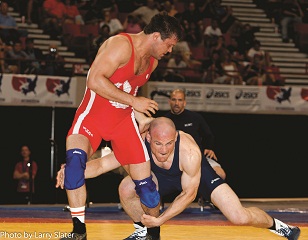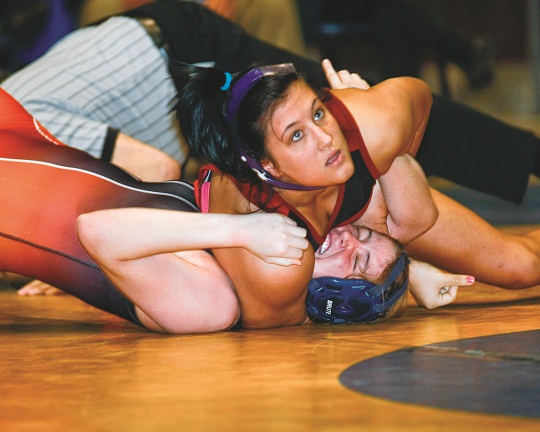
Wrestling is a sport that is all about style. Whether wrestling the Olympic styles—Greco-Roman and freestyle—or the homegrown American style known as folkstyle, wrestlers are focused on their form and highly dedicated to their chosen styles.
|
|
|
Wrestlers from across the country competed in USA Wrestling's World Team Trials hosted in Oklahoma City. Over 300 athletes fought for their chance to represent the United States at the World Championships later this year in Instanbul. Photo courtesy of Larry Slater. |
But why wouldn’t everyone wrestle the Olympic way? Jim Giunta, executive director of the National College Wrestling Association, explains that wrestling, considered by some to be the world’s oldest sport, is above all else a sport of tradition.
“Think about the way sports are passed down from generation to generation. Most dads will take their children out to shoot hoops even if those dads were never really basketball players,” says Giunta. “But only dads who were wrestlers take their kids out to teach them holds and throws in the backyard.”
In a way, wrestling is more than a sport; it’s a cultural memory that helps preserve history. Requiring little equipment in its most basic forms, wrestling developed alongside cultures across the globe, from America’s folkstyle, also called collegiate wrestling, to the Sumo wrestlers of Japan.
“The United States is blessed to have a popular folkstyle of wrestling … However, for the USA to maintain its position as a world power in international and Olympic wrestling, it must continue to expose its young people to the styles competed around the world, including freestyle and Greco-Roman,” says Lee Roy Smith, executive director, National Wrestling Hall of Fame & Museum. “All three styles are important to our nation's wrestling future.”
Because college wrestling is typically folkstyle, many—but not all—scholastic wrestling events, from youth to high school, are folkstyle contests as well.
“The coaches at our different levels communicate with the kids and families and decide which local tournaments to go to each weekend,” says Chad Vollmecke, head coach, Waukee High School, Waukee (Iowa). “It all depends on the level of competition, how well the tournaments are run, and family schedules. Resources like thepredicament.com and WIN Magazine help competitors gauge which events are the best fit.”
“Serious wrestlers know that the most important thing is time on the mat,” says Steve Saxlund, director of sports, Fargo-Moorhead Athletic Commission. Saxlund is more than an expert at pulling off successful wrestling events. He’s also the most successful wrestler in North Dakota State University history, taking down three national championships and a runner-up finish.
Fargo has been home to one of wrestling’s most prestigious bouts, the USA Wrestling Asics/Vaughn Junior & Cadet National Championships, for almost two decades. The Junior & Cadet Greco-Roman and Freestyle Championships have been headquartered in the Fargo Dome for so long that the competition is commonly referred to as the “Fargo Nationals.” So why the long North Dakota tenure?
Convenience tops the list. The Fargodome, seating approximately 20,000, is located on the NDSU campus, making it possible for athletes to walk to the event from dorms (room and board packages are available). Fargo is also a town where event organizers (and parents) don't worry about safety, and with nearly 20 years of experience, the Fargo-Moorhead Athletic Commission is perhaps the most compelling selling point.
“We’ve run the event for so long, our people always know what’s going on. It’s like clockwork,” says Saxlund. “Plus, we just try and to take really good care of them when they’re here.”
Getting Organized
The Fargo Nationals is a top USA Wrestling Greco-Roman and freestyle championship, but it’s certainly not the only match in town. USA Wrestling, the sport’s national governing body (NGB), has more than 160,000 members, including athletes of all ages, coaches, officials, parents and fans. USA Wrestling charters over 3000 wrestling clubs and sanctions over 1,600 local, state, regional and national competitions in all three American styles of wrestling.
Headquartered in Colorado Springs, USA Wrestling also hosts events in its hometown, such as the annual Dave Schultz Memorial Tournament at the U.S. Olympic Training Center. An event that draws some of wrestling’s greatest athletes, the event features top athletes from 23 countries.
AAU Wrestling
The Amateur Athletic Union (AAU), another leader in wrestling events for athletes of all ages and some of the biggest news in wrestling, is a new collaboration between these two wrestling powerhouses.
|
|
|
Nick Simmons v. Sam Hazewinkel - Nick won best of three series to secure his spot on world team. Sam is a former University of Oklahoma wrestler. Photo courtesy of Larry Slater. |
In August, USA Wrestling and AAU Wrestling leaders began discussing how they could work together to improve and expand the sport within the U.S, including the possibility of honoring both AAU and USA Wrestling cards for both organizations’ events.
This arrangement, if it comes to fruition, would allow USA Wrestling athletes access to AAU’s events, many of which are famous in the wrestling world.
“We have about 12 national events that range from the youth-oriented right up to the open division, and one of our signature events is the AAU Scholastic Duals, also known as the Disney duels because they’re held at Disney’s ESPN Wide World of Sports,” says Norm Palovcsik, wrestling media relations chair, AAU. “It’s a folkstyle meet that attracts over 250 teams.”
The AAU Junior Olympics is another of the organization’s key national events, and the organization plans additional wrestling tournaments for all ages around the country. Finding the right location for these events is an ongoing process, but Palovcsik says that when events find the right home, they’ll typically stick around for years to come. “Many of our wrestling events stay in the same location year after year because they’re successful. Local tourist bureaus really want to have our events in their towns because they’re great money makers.”
The NUWAY Way
National United Wrestling Association for Youth (NUWAY), founded in 2007, offers a third, state-centric, option for wrestlers. With lower membership costs than other national organizations and a national wrestling tournament that reinvests its profits in the state organizations, NUWAY aims to allow state NUWAY associations to keep their focus local. With chapters in 12 states, NUWAY has seen significant growth recently. The second annual NUWAY "FREAK SHOW" of Amateur Wrestling hit Bally's Hotel & Casino on Halloween weekend with increased numbers over the previous event.
The National Stage
National competitions, such as the Brute adidas Nationals, offer youth folkstyle wrestlers the chance to stake their claims as All-Americans in their weight classes. More than 1,200 wrestlers from around the nation converged on Independence, Missouri this April for the three-day tournament.
|
|
|
Cael Sanderson made his return to wrestling on the mats in Oklahoma City competing for a spot on another World Team. Sanderson beat Jake Herbert in final of World Team Trials. Photo courtesy of Larry Slater. |
“The event took place at our Independence Event Center. We have an amazing staff over there, and it’s just outside of the metro area, so it’s convenient and no one has to pay for parking,” says Cori Day, tourism director, City of Independence Tourism. “I volunteered at the event, and it was just incredible. It’s fascinating to see an event of that size go off in your own backyard.”
This was the first year for the event in Independence, and the city won a four-year contract with Brute adidas.
The Old College Try
The National Collegiate Wrestling Association (NCWA) is another organization working to increase opportunities for wrestlers by expanding collegiate wrestling programs across the country.
“Our organization is the governing body for collegiate style wrestling for colleges that do not offer NCAA wrestling,” says Jim Giunta, executive director, NCWA. “In college level athletics, financial decisions have to be made about which sports will benefit the school the most, in terms of revenue and students, and that can leave many Olympic-type sports like cross country, gymnastics and wrestling vulnerable to financial cuts.”
Giunta and his organization circumvent this challenge and continue increasing collegiate wrestling opportunities by starting wrestling programs through college student government or sports club programs. With their budgets coming from a source separate from the athletic departments, NCWA wrestling programs are free to take root and grow, and that’s exactly what they’ve done.
“We’ve come a long way, starting club level programs and helping build them into full-blown NCAA programs,” says Giunta. “And what’s amazing is how much we’ve grown, in spite of the fact that it might seem like we’re trying to extinguish ourselves all the time. That just shows the popularity of wrestling.”
NCWA’s national events typically take place in warmer climates so that, according to Giunta, attendees can make the event into a vacation.
The 2011 NCWA National Collegiate Wrestling Championships, which draw teams from 70-80 colleges and universities, called the University Center Arena at Macon, Georgia’s Mercer University home. The NCWA Dual Championships will return to the Northwest Georgia Trade and Convention Center in Dalton, Ga., for the second year in January 2012.
“I like a place like Dalton because our athletes feel like a big deal there,” says Giunta. “We could go to a big city, but they won’t even know we’re in town.”
More than 2,500 athletes and 130 traveling teams wrestle NCWA events each year.
“Our goal is to get as many wrestlers on the mat as possible,” says Giunta. And that’s exactly what they’re doing, especially for wrestling’s newest contingency of athletes: women.
The Ladies Have It
Women’s wrestling made its first Olympic appearance at the 2004 Athens games. With Olympic hopes on the horizon, women have been taking serious notice of wrestling, but for a long time, they had little chance to hit the mat, as only a smattering of NCAA schools offer women’s wrestling (and a few allow seriously promising women wrestlers to wrestle, but they’re counted as men on the rosters).
|
|
|
National Collegiate Wrestling Association Women's Nationals. Photo courtesy of Tabitha Wilson. |
In recent years, however, women have significantly increased their mat time thanks in particular to a number of organizations that offer opportunities for women to wrestle. But one of women’s wrestling’s biggest champions is the head coach at Oklahoma City University (OCU), Archie Randall.
“I go to colleges and say, ‘If you’re looking for an easy way to add 30-40 students to your campus, add a women’s wrestling program. There’s no equipment to add, and if you want more kids at your school, it’s an easy thing to do,” says Randall. “It’s great for the girls, too. If you’re a girl wrestler, and you want to go to college, there’s probably money out there to help you. Most of the girls on my team, they wrestle because their brother or dad did. The next generation, it will be because their mom wrestled.”
Thanks to Randall’s efforts, OCU has the best women’s wrestling program in the country, with OCU wrestlers traveling the world in the summers to compete. It’s a natural fit, considering the fact that Oklahoma already has some of the nation’s deepest – and most illustrious – wrestling roots.
“In a lot of ways, we’re the hotbed of wrestling,” says Sherri Rogers, executive director, Frontier Country Marketing Association. “A lot of great wrestlers have come out of Oklahoma.”
Oklahoma City sits at the center of wrestling hot spot, with Oklahoma State University and the Wrestling Hall of Fame to the north, the University of Oklahoma to the south, and OCU in the city.
“We’re so lucky to have an amazing wrestling tradition from youth to Olympic athletes who live and train here,” says Holly Shelton, sports business development manager, Oklahoma City Convention and Visitors Bureau. “We’re also incredibly lucky to have Coach Randall. He was a huge factor in bringing the World Team Trials to OKC.”
With the city’s obvious wrestling cred, as well as the Cox Convention Center—a one million-square-foot, 15,000-seat facility in downtown Oklahoma City -- the city offered an appealing home for the USA Wrestling World Team Trials.
“It was a great success for everyone and showed what Oklahoma City can offer,” says Shelton. “We’re also hosting the 2014 NCAA Championships. We had them back in 2006, and we’re so excited to have them back. Wrestling has such a fan base here. It’s always a sell out. We anticipate an attendance of 90,000 over the four-day event.”





